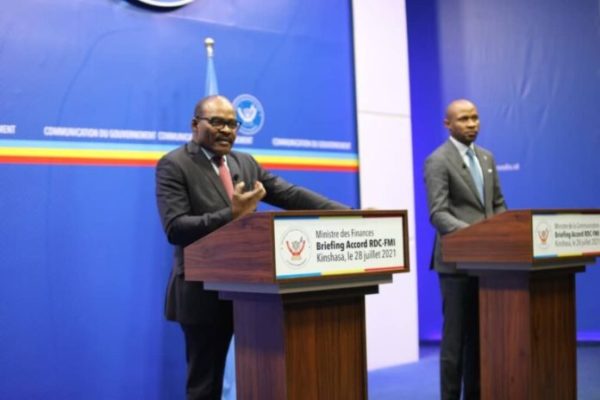At a press conference on July 28, 2021 in Kinshasa, Minister Nicolas Kazadi of Finance of the Democratic Republic of Congo (DRC) indicated that the country is waiting for other economic partners after the resumption of the program with the International Monetary Fund (IMF), which gives a strong signal to the economic world that the DRC is pursuing the international standards accepted by all, after the finalization of the discussions held between April and July 2021.
Under this three-year program running from 2021 to 2024, Kinshasa should benefit from a global envelope of 1.52 billion USD, the first immediate disbursement of which of 216.9 million USD was made following the approval of the council of IMF administration. The conclusion of this program follows the IMF’s decision, dated July 15, 2021, approving the signing of this new program with the DRC. When it comes to repayment terms, the country is getting away with “zero interest”.
“In January 2019, the DRC again initiated, through the Head of State, its intention to renew cooperation with the IMF (because) this cooperation was interrupted in 2009 following several concerns in the context of macroeconomic management , incidents which did not allow the conditions imposed by this program to be met. In May 2019, an IMF team arrived for a review to initiate the discussion of the program with an observation period that was to end at the end of 2019 but unfortunately it encountered difficulties in meeting certain criteria and the pandemic. of Covid-19 has occurred. As a result, the observation period has been extended until 2020 “, explained the Minister of Finance.
“The IMF, having seen the will of the government, agreed to grant resources in terms of facilities with a credit of $ 367 million which allowed the country to cope with the adverse effects of Covid-19”, he said. he added, specifying that “this gesture, accompanied by other support, has enabled the DRC to face all the budgetary constraints during this period of crisis, with the change of members of the government”.
The reforms expected in the medium term for this program at the government level will mainly focus on increasing the mobilization of domestic revenue, the promotion of investments in particular by the private sector to promote sustainable growth and job creation, improvement of governance and strengthening of the monetary policy framework.



